Kiruna in the spotlight during the Swedish EU presidency inauguration
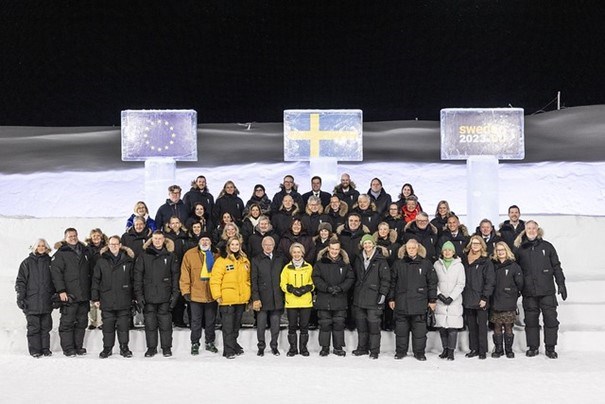
On January 12–13, Europe's eyes turned north when the Swedish government and the European Commission gathered in the north Swedish town of Kiruna for the formal inauguration of the Swedish presidency of the Council of the European Union. By inviting the EU Commission to Kiruna, the government had the opportunity to show a taste of what Sweden has to offer the EU and the rest of the world - as a forerunner in the green industrial transition and a leader in innovative technology, combined with magnificent and resource-rich nature. In connection with the EU Commission's visit, Swedish mining giant LKAB unveiled the news that Europe's largest supply of rare earth metals was discovered in Kiruna. Esrange Spaceport - was inaugurated as the EU mainland's first facility for launching satellites. North Sweden was on site in Kiruna to cover these historic and eventful days.
At the turn of the year, Sweden took over the rotating presidency of the Council of the European Union, which began with the Swedish government inviting the European Commission collegium to Kiruna on 12–13 January. It is tradition for the EU Commission to visit the new Presidency country for an introductory meeting but usually, this takes place in the capital or other major cities, which made the inauguration in Kiruna, 2,800 kilometres north of Brussels, very special. By inviting the EU Commission to Kiruna in particular, the government had the opportunity to showcase Sweden at the forefront - as a forerunner in the green industrial transition and a leader in innovative technology, combined with magnificent and resource-rich nature.
It was an eventful and well-directed visit, when the European Commission, the Swedish government and around 70 Brussels-based EU correspondents gathered in Kiruna - in the middle of the European Arctic. In addition to the summit itself, where priorities during the Swedish presidency were discussed, there was also a display of northern Sweden's unique hospitality industry, sustainable mining industry and world-class space industry. Among other things, the news about the giant find of rare earth metals in Kiruna was launched, the new satellite launch site Esrange Spaceport was inaugurated and the entire EU Commission spent the night at the Ice Hotel in Jukkasjärvi. These events have been widely reported in major European media since then, often with the Arctic city of Kiruna as the starting point.
Regional and local perspectives on societal transformation
The Swedish government's visit to Kiruna began in the new town hall Kristallen with a presentation from Kiruna's three municipal councillors Mats Taaveniku, Emilia Töyrä and Sanna Inga Poromaa, the governor of Norrbotten County, Lotta Finstorp, and the chairman of the board of the Sami Parliament, Håkan Jonsson, who had the opportunity to give their perspectives on the possibilities and challenges that societal transformation entails. Håkan Jonsson informed us about the challenges Sami is facing with the green transition. Lotta Finstorp emphasized how Norrbotten not only builds green industries - but also attractive communities, with exciting job opportunities as well as proximity to nature and culture. The municipal councillor Mats Taaveniku also got to speak in front of the ministers about the exciting developments taking place in Kiruna municipality, including new mining ventures and a growing tourism industry.

Europe's largest deposit of rare earth metals found in Kiruna
The Swedish government and around 70 EU correspondents were allowed to visit LKAB's mine, where LKAB's CEO Jan Moström and Minister for Energy, Business and Industry Ebba Busch held a press conference where the big news was unveiled - LKAB has made the largest find in Europe of rare earth metals. At present, Europe is completely dependent on imports of rare earth metals, with China dominating the supply, while the demand for these minerals is expected to increase sharply as they are needed for electric cars and wind turbines. The find may therefore come to play a key role in the green transition in Europe as well as the EU's self-sufficiency and continued competitiveness – all important issues during the Swedish presidency.
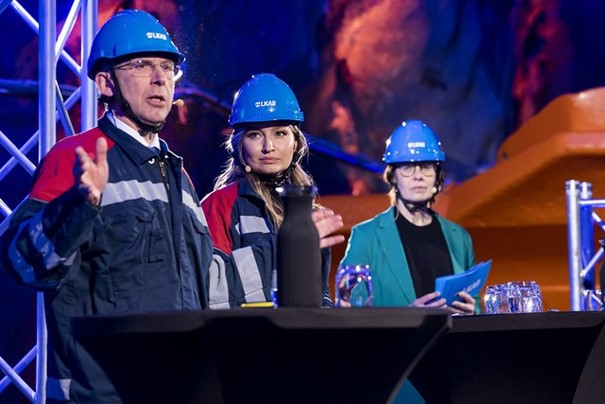
Jukkasjärvi was the first stop for the European Commission
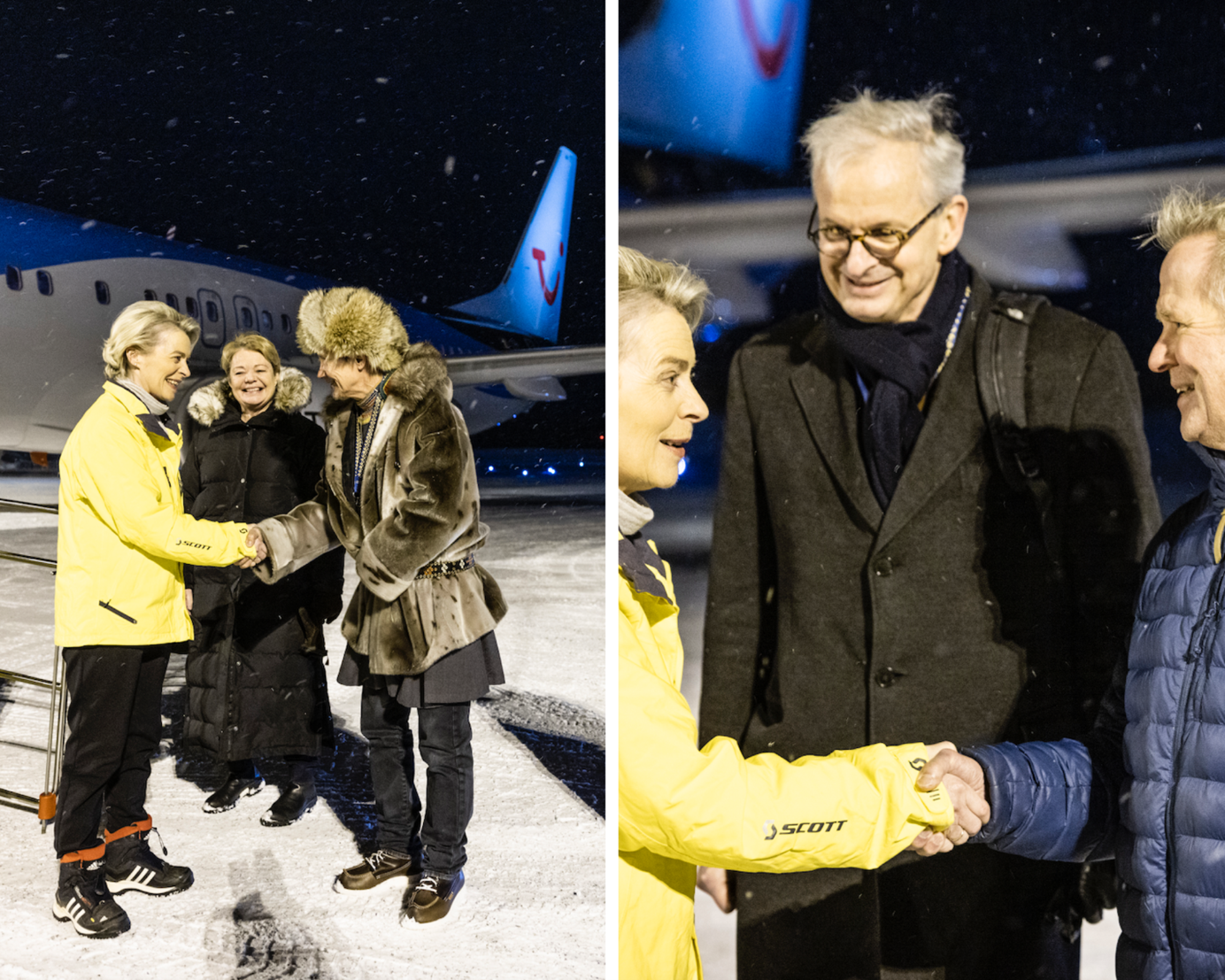
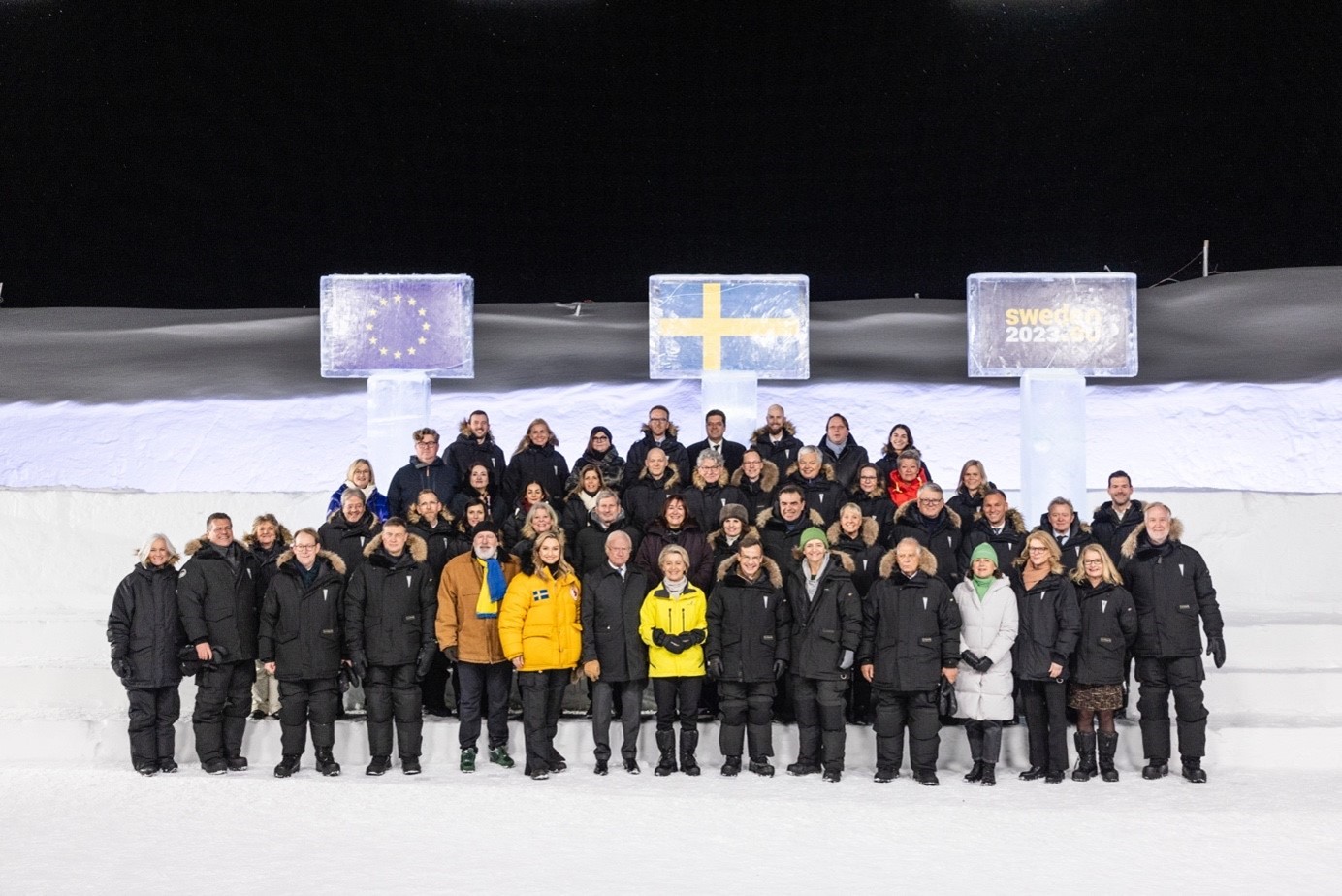
Spaceport Esrange – Europe's independent access to space via northern Sweden
The EU Commission's second day began at the Esrange Space Center outside Kiruna, where a satellite launch site was inaugurated - Spaceport Esrange - by Swedish Monarch King Carl XVI Gustav, Prime Minister Ulf Kristersson and European Commission President Ursula von der Leyen. The space base is the first of its kind and gives the EU independent access to space and launch capacity for small new satellites. In addition, the base will also be used for the EU's test project with reusable rockets, which should lower the costs of the launches. "This is a big moment for Europe, it's exactly the infrastructure we need," said Ursula von der Leyen during her speech, pointing out the usefulness of satellite monitoring in monitoring climate change or traffic flows.
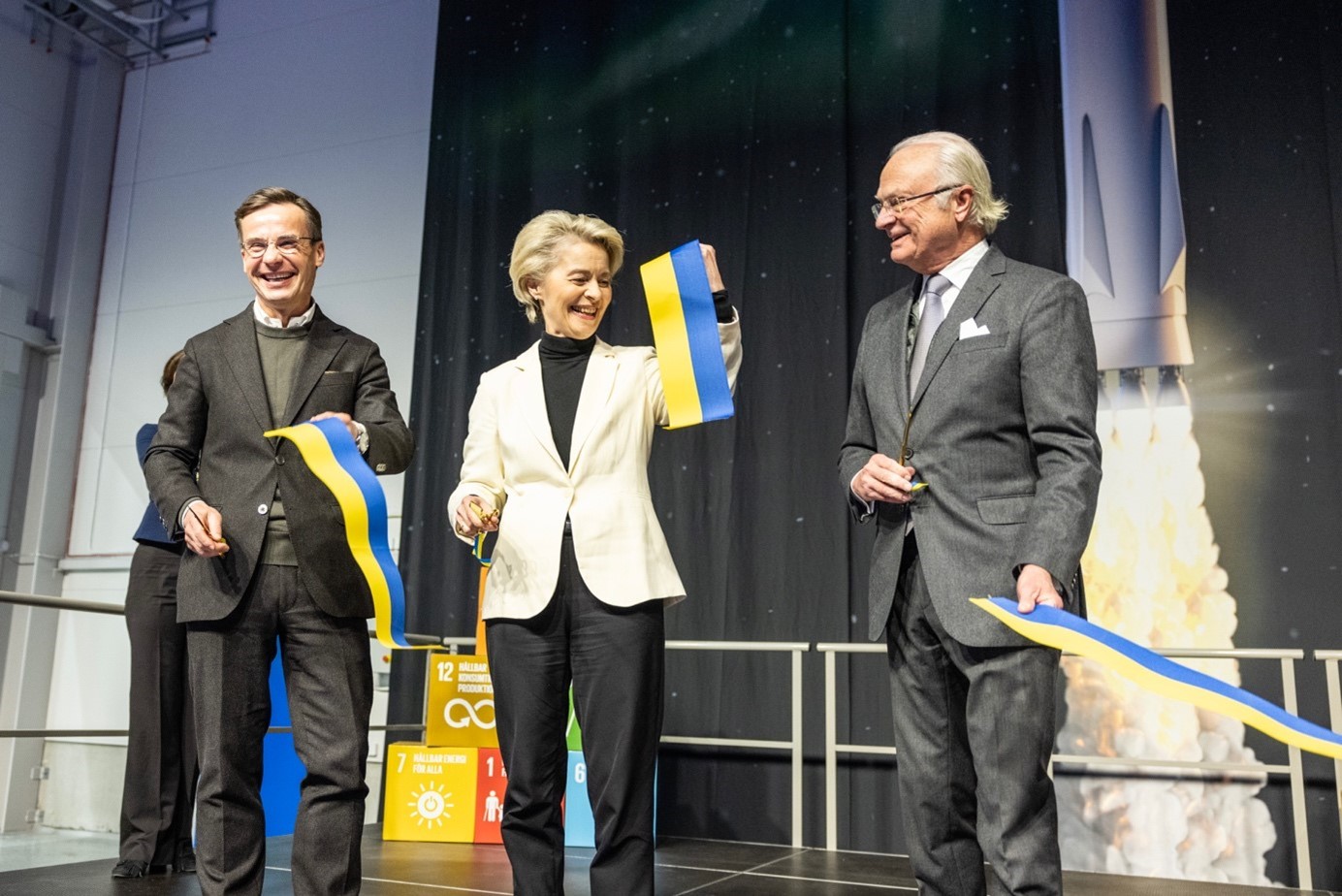
A greener, safer and freer EU
Later on the second day of the visit, the Swedish government and the EU Commission met in the new Aurora cultural centre to discuss current issues on the EU's agenda and the policies that Sweden wants to pursue in the next six months with a focus on security, resilience, competitiveness, green transition, democratic values and the rule of law.
Key actors in the green industrial revolution in Sweden arranged an exhibition entitled "Value Chains for the Twin Transition" in Aurora, coordinated by Swedish mining trade organisation Svemin, where the European Commission could get an insight into how the sustainable value chains in the north together lead the global green transition.
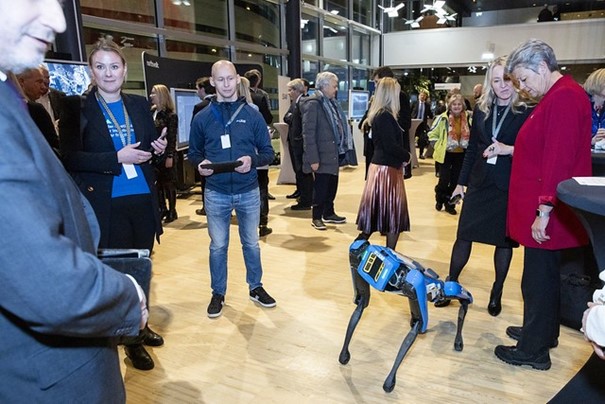
To conclude the evening, Sweden's Prime Minister Ulf Kristersson and the President of the European Commission Ursula von der Leyen held a joint press conference on Friday, where the war in Ukraine and the security policy situation dominated the speeches. Prime minister Kristersson placed a lot of emphasis on northern Sweden's role in the green transition:
- The Norrbotten region is a forerunner in the European green transition. Iron ore mines combined with fossil-free energy production lead the way for carbon-free steel production [...] This part of Europe has a lot of forests. I have reminded the European Commission of the important role the bio-economy from European forests plays in the transition from fossil-based energy.
On the topic of energy, von der Leyen also announced that the European Commission will come up with a reform of the design of the electricity market:
- We must continue our work to make energy more affordable for Europeans. We will propose a reform of the design of the electricity market this spring.
Regarding competitiveness, the American climate package the "Inflation Reduction Act", IRA, was discussed, where Europeans fear that investments in green industries will be attracted to the USA due to the subsidies promised by the package and the risk of uneven competition from China. The president of the European Commission, therefore, highlighted upcoming legislation that will reduce Europe's dependence on, among other things, raw materials:
- This new legislation would also include a review of some of the permit requirements that we have. I hear time and time again that it is always the permit issue that is the most urgent in these projects for renewable energy sources, says Ursula von der Leyen.
Kiruna and northern Sweden make headlines around Europe
Around 70 Brussels-based EU correspondents were also invited to Kiruna to cover the opening. In addition to the press meetings, the correspondents were also given their visiting program in Kiruna where local actors gave their insight into Kiruna's unique urban transformation and business life, including the growing hospitality industry, and finally organized a well-appreciated dog sledge tour for the journalists.
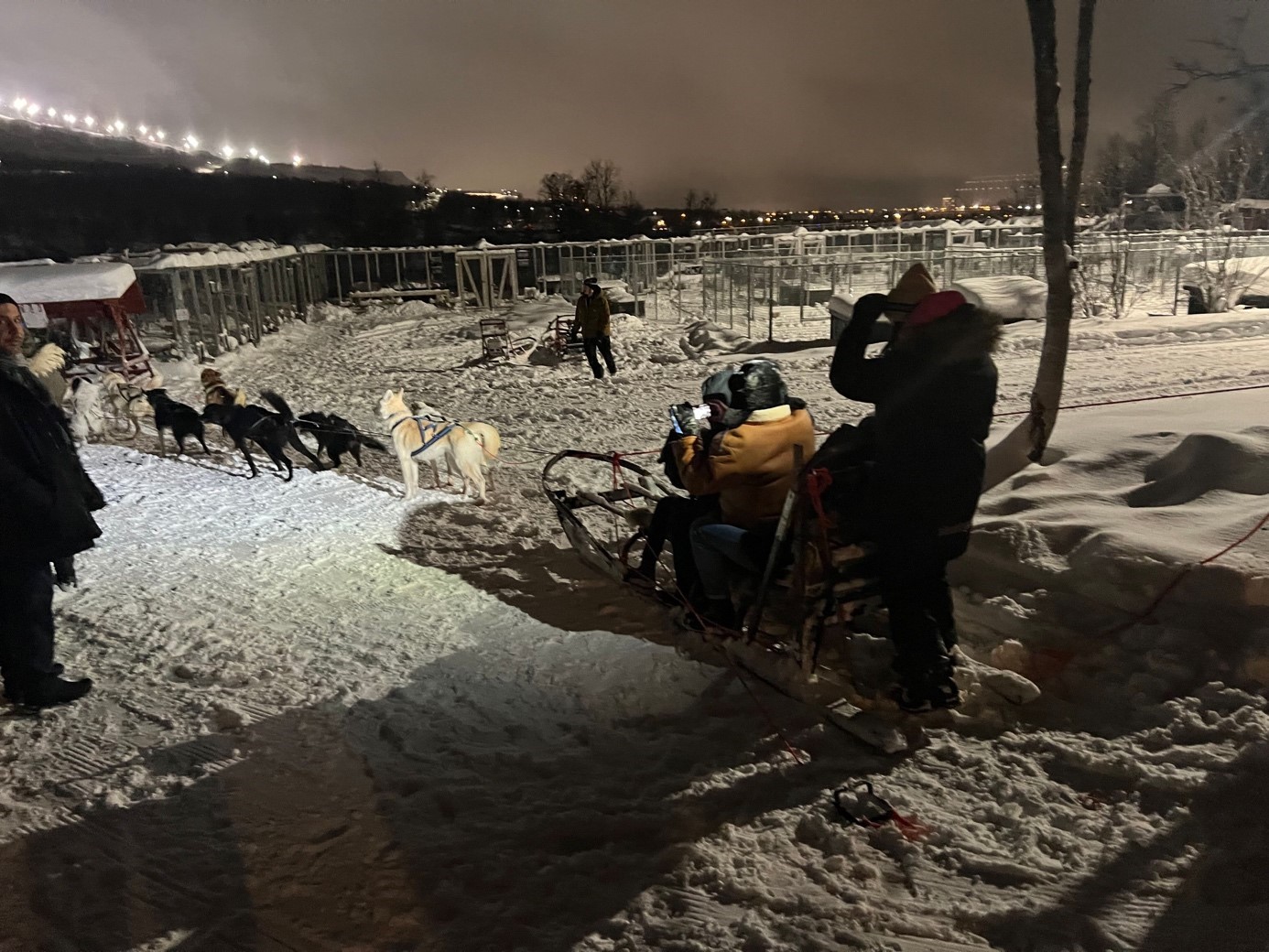
There were many large media on-site when Kiruna and northern Sweden are now reported in all major European media, the emphasis was directed at the newly discovered deposits of rare earth minerals and the Esrange spaceport. Employees from North Sweden European Office were on site in Kiruna during the inauguration to monitor the historic visit. We had the opportunity to meet with Swedish public broadcaster SVT Nyheter to talk about the significance of the inauguration of Sweden's presidency taking place in Kiruna and the attention that is now being directed towards northern Sweden's green adjustment. Hopefully, the visit to Kiruna contributes to the EU commissioners gaining an insight into the societal transformation that is already taking place in northern Sweden, but also an understanding of the challenges that societal change entails at the local and regional level.
